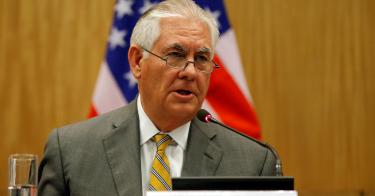Not all is well at the State Department. The administration has taken some well-deserved criticism for its slowness in appointing key political personnel. But that doesn’t explain the media’s sustained assault on Secretary of State Rex Tillerson, who is pounded by pundits and battered by bad press on a near daily basis. You can chalk it up, in part, to today’s hyper-partisan political environment, where taking potshots at the administration has become a popular sport. It arises partly, too, as a reaction to Tillerson’s unconventional “take” on the role of the nation’s chief diplomat.
But Tillerson’s biggest problem appears to be his “aberrant” desire to shake-up Foggy Bottom. Nothing more upsets D.C.’s glitterati — the career politicians, the upper-echelon bureaucrats, and the reporters and commentators who rub shoulders with them for a living — than someone bent on roiling the status quo. And Tillerson is serious about making deep, institutional reforms at the State Department, the most glamorous department in all of Washington.
It’s also one of the most politicized, feather-bedded and incoherently organized departments in the nation’s capital. Tillerson is working hard to change all that. He should be getting cheers, not jeers. Consider, for example, the “special envoys” strewn throughout the agency. These appointed officials don’t work within the national or regional desk system typical of the department.
Rather, they each have a “mission-oriented portfolio,” or special diplomatic mission, with the entire world as their playground. They get their own staffs and their own budgets. And if a special envoy’s mission is unnecessary or outdated, if it overlaps and duplicates functions provided by other State Department desks… So what? They’re “special,” so they get to play ambassador whether they’re making any demonstrable progress toward advancing America’s interests or not.
During the Obama administration, special envoys multiplied like rabbits. Eliminating or consolidating many of these posts can streamline the department significantly, reducing waste and improving the coherence of agency functions. Take, for example, diplomacy with North Korea. This has not been a stellar success for any of the last several administrations, and a dangerous reality dramatically underlined this week when Kim Jong Un lobbed another missile over Japan.
Yet the State Department still houses a special envoy for the Six-Party Talks. Those were the talks designed to convince Pyongyang to give up its nuclear programs. And the last such “talk” took place nearly a decade ago. In truth, the Six-Party Talks between North and South Korea, the United States, Japan, China and Russia were, in the words of former U.N. Ambassador John Bolton, nothing more than a “charade.” Nothing ever came of them. The envoy was, effectively, just a diplomatic placebo.
It’s time to get back to realism. If the Six-Party Talks ever become a serious diplomatic tool, then the president can appoint another envoy. Until then, why waste the space at the State Department? Tillerson has offended D.C.’s status quo by asking that question repeatedly. After all, there are nearly 70 “special envoys” or “special representatives” peppered throughout the diplomatic service.
On Tuesday, we learned his answer. The Trump administration informed Congress that it has decided to eliminate nine such positions, while some 26 others will be folded or integrated into existing lanes or positions at the State Department. Gone will be the “special envoy for climate change” and the “special representative for the Arctic region.” Their functions and staffs will be assumed by the Bureau of Oceans and International and Scientific Affairs.
The title of “special envoy for conflict diamonds” will be removed. A deputy assistant secretary in the Bureau of Economic and Business Affairswill handle that portfolio. Completely eliminated, along with the Six-Party Talks envoy, will be the position and functions of the “transparency coordinator,” “special advisor for global youth,” and the “personal representative for Northern Ireland issues.”
Northern Ireland Issues? The Good Friday Agreement stopped large-scale violence between Protestants and Catholics in Northern Ireland nearly 20 years ago. Tillerson’s action signals that Milton Friedman’s famous dictum that “nothing is so permanent as a temporary government program,” may finally no longer hold. And the keepers of the status quo find that highly disturbing.
In a letter to Sen. Bob Corker (R-Tenn.), chairman of the Foreign Relations Committee, Tillerson noted that the reforms will do more than save money and streamline operations. These integrations also help “address concerns that under the current structure, a special envoy or representative can circumvent the regional and functional bureaus that make up the core of the State Department.” Tillerson’s shakeup is long overdue. His attackers are stuck in a wasteful world of dysfunctional diplomacy.
This Piece originally appeared in The Hill on 08/29/17





